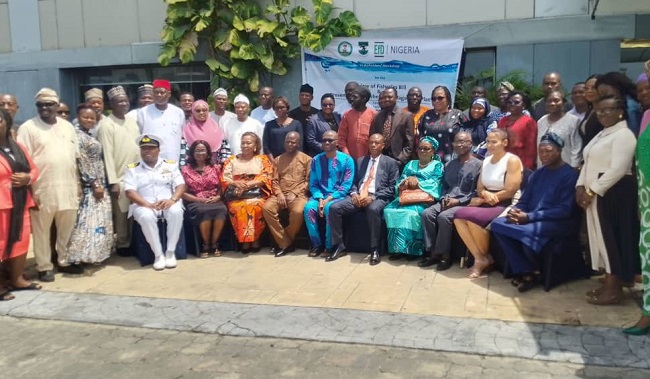The Resource and Environmental Policy Research Centre (REPRC) has declared that constituting an institutional framework will not only go a long way to develop the Fisheries and Aquaticulture sector of Marine and Blue Economy, but it will also ensure the sustainability of the sector for the coming generation.

Prof. Nnaemeka Chukwuone, Director, REPRC, of the Environment for Development (EfD Nigeria), University of Nigeria Nsukka, who made this submission on Tuesday, April 15, 2025, while speaking to journalists in Lagos during the Review of Sea Fisheries Bill and Fisheries Management Plan Workshop, said there is need to review the Fisheries Act 1992.
He said: “After 32 years, this Act needs to be reviewed and updated so that Nigeria will have a fisheries law that is in tandem with the global standard.”
In his speech, Alhaji Gboyega Oyetola, Minister of Marine and Blue Economy, noted: “It is a fact that the Sea Fisheries Act of 1992, though instrumental in its time, no longer reflects the contemporary realities, technological advancements, ecological concerns, or economic complexities of today’s marine environment.”
The Minister, who was represented by Mr. Paul Opuama, Director of Fisheries Support Services, Abuja, added: “The Sea Fisheries Act lacks provisions to fully address critical issues such as climate change, ecosystem-based management, traceability, monitoring and surveillance technologies, and global trade compliance.
“This is why the Federal Ministry of Marine and Blue Economy, under my leadership and in line with the Renewed Hope Agenda of His Excellency, President Bola Ahmed Tinubu, is fully committed to ensuring that the reviewed Bill is enacted by the Federal Executive Council.
“We understand the urgency of this matter and will work diligently to expedite the process toward establishing a robust legal and regulatory framework. This framework will align with international obligations such as the FAO Code of Conduct for Responsible Fisheries, the Port State Measures Agreement, and the UN Sustainable Development Goals – particularly Goal 14, which seeks to conserve and sustainably use ocean and marine resources, holding immense promise for our nation” he stressed.
Mr. Omoragbon Wellington, Director Fisheries and Aquaculture, highlighted the importance of inter-agency collaboration and the successful implementation of the reviewed Act and the Fisheries Management Plan, adding that it will require a unified approach, involving not only the Federal Department of Fisheries and Aquaculture, but also the Nigerian Navy, the Nigerian Maritime Administration and Safety Agency (NIMASA), the Nigerian Institute for Oceanography and Marine Research (NIOMR), and various state agencies.
“The revised Fisheries Management Plan must integrate local knowledge systems and traditional governance practices that have sustained coastal communities for generations,” he stressed.
On his part, Mr. Babatunde John Olusegun, retired Director, Department of Fisheries and Aquaculture, opined that reviewing the Bill would go a long way in managing the marine resources.
“The resources will be conserved, even the foreigners coming into the country will be cautioned especially when they see that our laws are deterrent,” he added.
Associations that were represented at the workshop include Nigeria Trawler Owners Association (NITOA), Fisheries Society of Nigeria (FISON), Catfish and Allied Fish Farmers Association of Nigeria, Tilapia Aquaculture Developers Association of Nigeria, and Association of Indigenous Fish Importers, among others.
By Ajibola Adedoye
